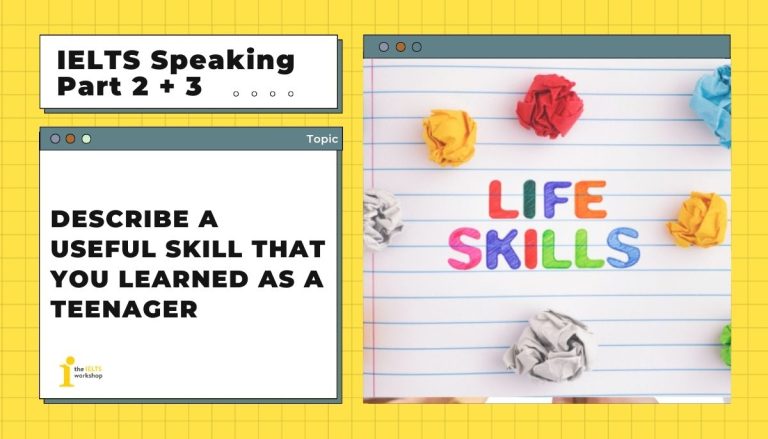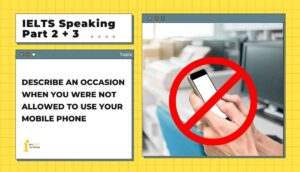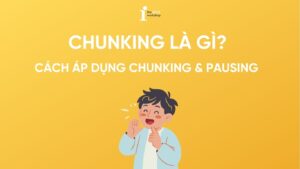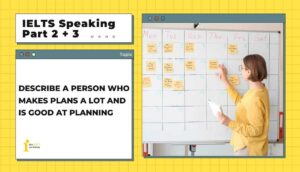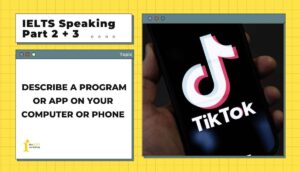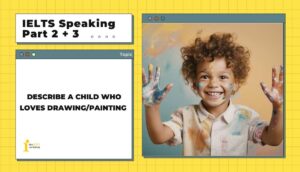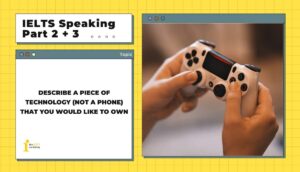Trong chuyên mục giải đề dưới đây, thầy Phi Long của The IELTS Workshop sẽ hướng dẫn bạn trả lời topic “Describe a useful skill that you learned as a teenager” trong IELTS Speaking Part 2. Cùng tham khảo sample, từ vựng và một vài cách diễn đạt ghi điểm trong phần thi IELTS Speaking nhé.
Part 2: Describe a useful skill that you learned as a teenager
Describe a useful skill that you learned as a teenager
You should say:
What the skill is
When and how you learned it
Who you learned it from
Why you learned it
And explain how you felt about learning it
Dưới đây là bài mẫu cho topic “Describe a useful skill that you learned as a teenager“.
1. Bài mẫu (Sample)
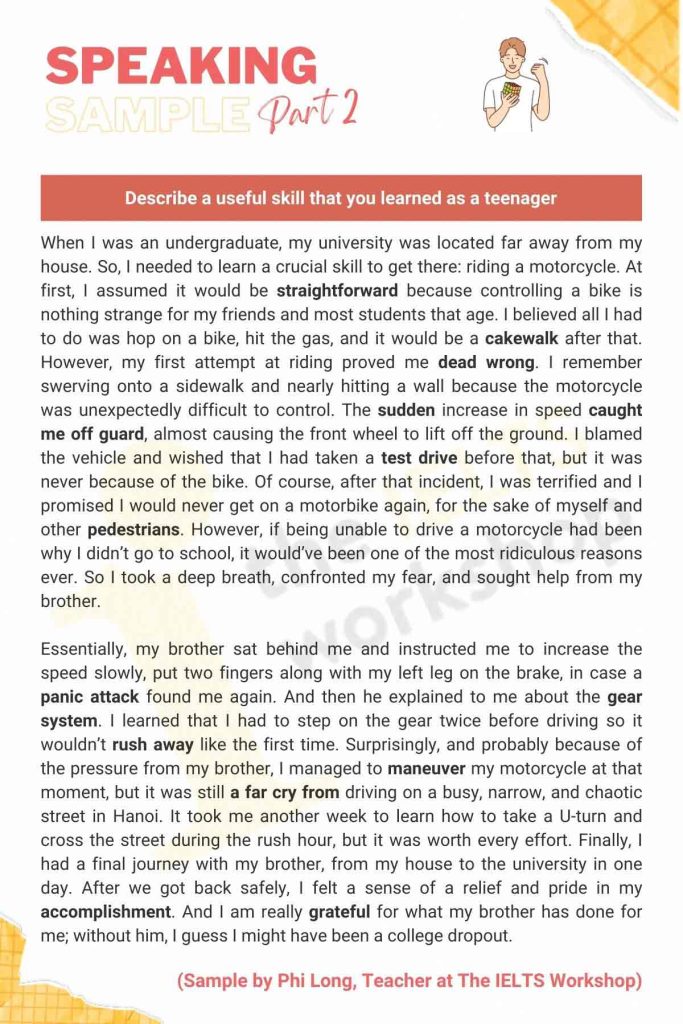
2. Từ vựng (Vocabuary)
- Straightforward (adj): dễ dàng, đơn giản
- Maneuver (v): điều khiển một cách cẩn thận
- Cakewalk (idiom): một điều dễ dàng làm được
- Dead wrong (collocation): nhầm to
- Sudden (Adj): đột ngột
- Test drive (n): lái thử để xem xe (thường là ô tô) có phù hợp trước khi mua
- Pedestrian (n): người đi bộ
- Panic attack (n): cơn hoảng loạn
- Gear system (n): hệ thống số trên xe
- Rush away (v): lao vút đi
- A far cry from (idiom): một điều rất khác so với
- Chaotic (adj): hỗn loạn
- Accomplishment (n): thành tựu
- Appreciate (v): trân trọng
- College dropout (n): người bỏ học đại học
Part 3
Where do children learn skills in your country?
What are the differences between learning skills on your own and from others?
What important skills should a child learn?
What skills do you think teenagers should have?
Who should teach teenagers skills?
What are the differences between children learning skills and adults learning skills?
1. Where do children learn skills in your country?
It depends on what kind of skills that they need to learn. If they are academic skills, apparently schools will be an ideal setting where they can acquire new knowledge, develop traits and learn strategies for their study. However, when it comes to social skills, the people around them can be the primary influence. For instance, many children learn about establishing rapports, etiquette and other communicating skills by interacting with parents, teachers and their friends.
- Academic skills: kĩ năng học thuật
- Strategies (n): chiến lược
- Rapport (n): Mối quan hệ tốt
- Etiquette (n): quy tắc ứng xử
2. What are the differences between learning skills on your own and from others?
Learning skills by oneself can indeed be considerably more challenging. It demands a high level of discipline and patience, as it involves a significant amount of trial and error. Mistakes can lead to discouragement, yet independent learning grants the freedom to set your own pace and explore topics of personal interest. On the other hand, learning from others, be it teachers, peers, or superiors, offers invaluable guidance, shared experiences, and expertise. Additionally, they can provide objective assessments and feedback, pinpointing issues that may go unnoticed when learning by yourself.
- Discipline (n): tính kỉ luật
- Patience (n): tính kiên nhẫn
- Discouragement (n): sự chán nản
- Trial and error: thử và phát hiện lỗi sai
- Pace of learning: nhịp học tập
- Superiors (n): cấp trên
- Objective assessment: đánh giá khách quan
3. What important skills should a child learn?
For comprehensive development, children need to acquire several important skills. Firstly, communication skills are crucial. Clear self-expression enables others to understand and support children more easily. Additionally, active listening and engaging in conversations help children build relationships, laying the foundation for their character development. Secondly, parents should prioritize equipping their children with digital literacy from an early age. This enables children to discern beneficial content from harmful material on social media platforms
- Comprehensive (adj): toàn diện
- Crucial (adj): thiết yếu
- Foundation (n): nền tảng
- Character developemt: sự phát triển tính cách
- Digital literacy (n): trình độ kỹ thuật số
- Discern (v): phân biệt
4. What skills do you think teenagers should have?
For adolescents, critical thinking is crucial, to say the least. It’s common to see teenagers engage in reckless behaviors without considering the consequences, which can result in long-lasting or even permanent damage. If they can weigh the pros and cons of their actions more carefully, I believe many young people can make much better decisions, ultimately paving the way for a healthier adulthood. Additionally, self-care is another essential skill that teenagers should develop. This will help them prioritize their physical and mental well-being alongside their academic pursuits.
- Adolescents (n): những người ở tuổi vị thành niên
- Critical thinking: tư duy phản biện
- Reckless (adj): liều lĩnh
- Permanent (adj): vĩnh viễn
- Adulthood (n): tuổi trưởng thành
- Self-care (n): tự chăm sóc bản thân
- Prioritize (v): ưu tiên
- Pursuits (n): theo đuổi
5. Who should teach teenagers skills?
From my perspective, it should be a joint effort among parents, teachers and teenagers themselves. Of course, parents are always role models for their children and the closest sources of influence, so teenagers often pick up parents’ skills in daily life. However, teachers or any kind of educators should be accountable for the academic knowledge because they have higher expertise in such fields compared to parents.
- Joint effort: nỗ lực chung
- Role model: hình mẫu
- Pick up (phrasal verb): học
- Accountable = responsible (adj): có trách nhiệm
- Academic knowledge: kiến thức học thuât
- Expertise (n): chuyên môn
6. What are the differences between children learning skills and adults learning skills?
The first notable difference between the young and old is the pace of learning. While children are more flexible and generally good at accumulating new knowledge, adults may have many limitations due to their existing knowledge and cognitive framework. As a result, children normally learn faster than adults. Another difference that I can think of is the style of learning. Children have a preference for games and entertaining activities, but adults usually opt for more logical, serious, and empirical methods that allow them to connect their prior knowledge with new information.
- Flexible (adj): linh hoạt
- Accumulate (v): tích lũy
- Limitation (n): hạn chế
- Cognitive framework: khung nhận thức
- empirical (adj): dựa trên thực nghiệm
- Prior knowledge = existing knowledge: kiến thức có sẵn
Bài mẫu bởi thầy Phi Long – Giáo viên The IELTS Workshop HN
Trên đây là bài mẫu cho topic: Describe a useful skill that you learned as a teenager. Các bạn có thể tham khảo các bài mẫu IELTS Speaking khác của The IELTS Workshop tại đây!
Để có thể học và nắm được phương pháp xây dựng câu trả lời cho phần thi IELTS Speaking Part 3, tham khảo ngay Khóa bổ trợ từng kỹ năng IELTS chuyên sâu của The IELTS Workshop


